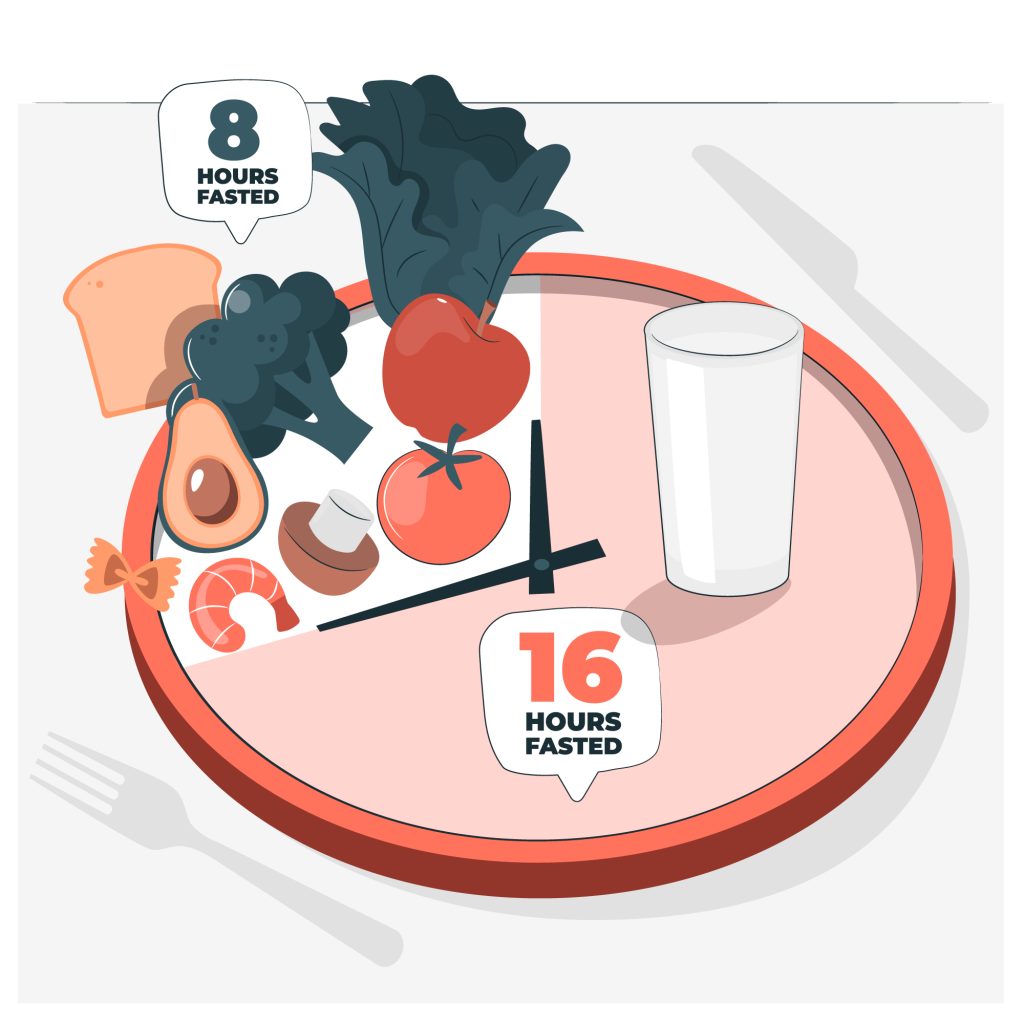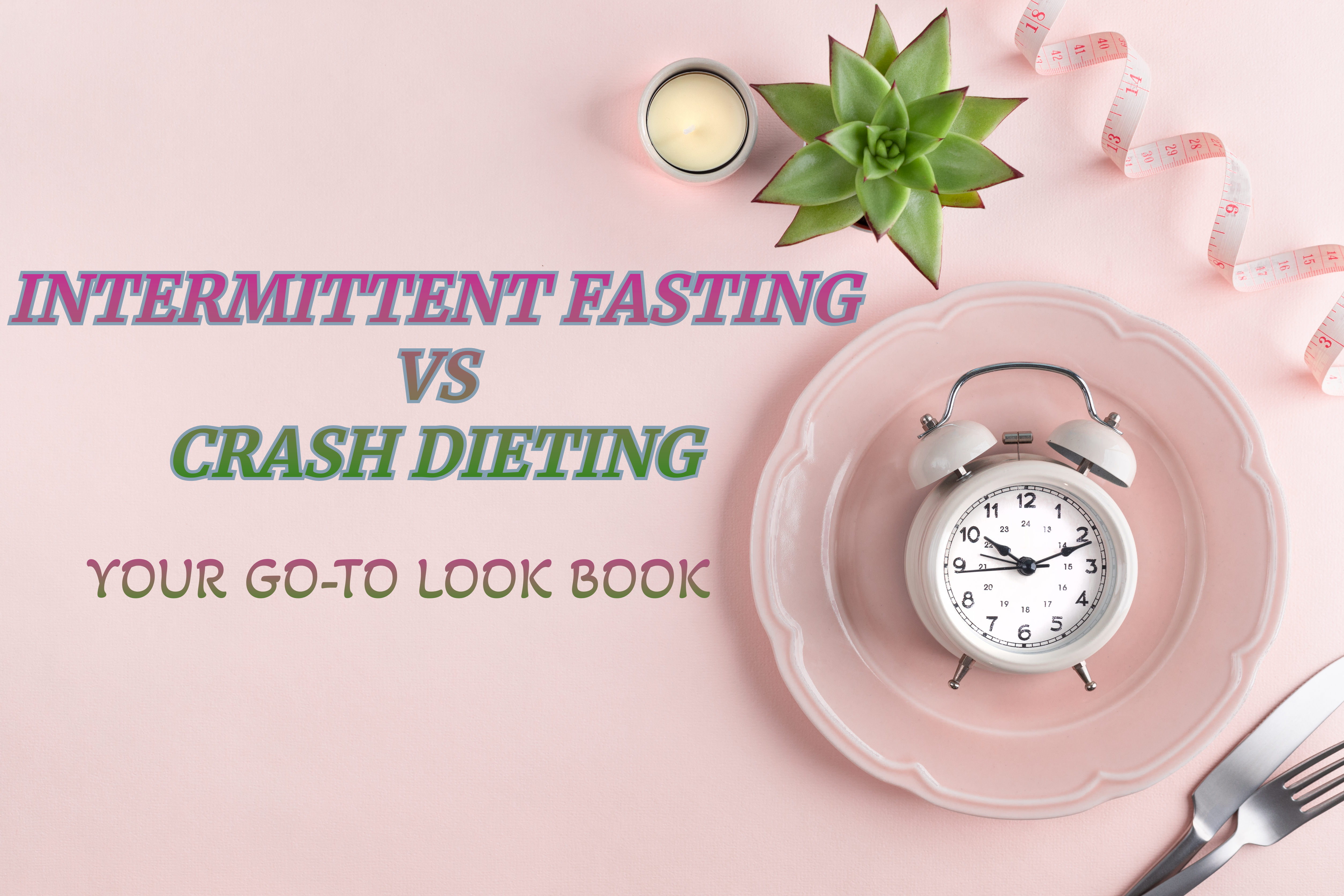YOUR GO-TO LOOKBOOK FOR INTERMITTENT FASTING VS CRASH DIET
What is Intermittent Fasting?

Intermittent fasting (IF) has gained significant attention as a lifestyle choice that contrasts sharply with traditional dieting methods.
Unlike crash diets or many fasting protocols used in scientific studies, intermittent fasting focuses on the timing of your meals rather than the specific foods you consume or the caloric intake.
The central concept is to alternate between periods of eating and fasting, with a particular emphasis on short fasting periods that are manageable and can be seamlessly integrated into daily life.
Unlike extended fasts, which last longer than 36 hours and can often be categorized as simple fasting or even starvation, intermittent fasting typically involves shorter periods where food intake is restricted.
The idea is not to deprive the body of essential nutrients but to optimize the timing of meals to enhance metabolic processes.
Critics often misconstrue fasting as equivalent to starvation, but the distinction lies in the controlled and intentional nature of intermittent fasting, which is designed to harness the body’s natural metabolic cycles for improved health.
Key Differences Between Intermittent Fasting and Crash Dieting
Purpose and Approach
One of the most critical distinctions between intermittent fasting and crash dieting lies in their respective purposes and approaches.
Intermittent Fasting:
Intermittent fasting is an eating method that involves cycles of fasting and eating.
The primary focus is not on the quantity or type of food consumed but on when it is consumed.
This approach is often adopted for various health benefits, including weight management, improved metabolic health, and increased longevity.
By limiting the time window during which you eat, intermittent fasting can help regulate insulin levels, enhance fat-burning processes, and potentially improve overall health.
Crash Dieting:
In contrast, crash dieting typically involves drastically reducing calorie intake over a short period, with the primary goal of achieving rapid weight loss.
These diets often eliminate entire food groups or severely limit caloric intake, which can lead to quick but unsustainable results.
Crash diets are often associated with a high risk of nutritional deficiencies and other health issues due to their extreme nature.
Long-Term Sustainability
The sustainability of any dietary approach is crucial for its long-term success.
Intermittent Fasting:
Intermittent fasting is generally considered sustainable for the long term because it can be adapted to suit various lifestyles and individual preferences.
Unlike crash dieting, it doesn’t require severe calorie restriction or elimination of certain food groups, making it easier to maintain.
Many people find that intermittent fasting helps them control their food intake naturally, reducing the frequency of hunger pangs and overeating, which can lead to more sustainable weight management over time.
Crash Dieting:
On the other hand, crash diets are notorious for being unsustainable.
While they may lead to rapid weight loss initially, this is often followed by a rebound effect where the lost weight is quickly regained once normal eating patterns are resumed.
This yo-yo effect can negatively impact metabolism, leading to long-term difficulties in maintaining a healthy weight.
Moreover, the extreme nature of crash diets can cause physical and psychological stress, making them impractical for long-term health and well-being.
Metabolic Effects
The impact of intermittent fasting and crash dieting on metabolism is another area where these approaches differ significantly.
Intermittent Fasting:
Research suggests that intermittent fasting can positively affect metabolism by improving insulin sensitivity, reducing inflammation, and promoting cellular repair processes.
By giving the body regular periods of fasting, insulin levels remain stable, which helps in reducing fat storage and promoting fat loss.
Additionally, intermittent fasting can trigger autophagy, a process where the body cleans out damaged cells and regenerates new ones, which is essential for maintaining cellular health and preventing age-related diseases.
Crash Dieting:
Crash dieting, in contrast, can have detrimental effects on metabolism.
Severe calorie restriction can slow down metabolism as the body enters a survival mode, conserving energy and burning fewer calories.
This metabolic slowdown can lead to
-muscle loss
-hormonal imbalances
-reduction in overall energy levels
Over time, these negative effects can make it increasingly difficult to lose weight and maintain a healthy metabolism.
Health Implications
The health implications of intermittent fasting versus crash dieting are profound, with the former offering several potential benefits and the latter posing significant risks.
Intermittent Fasting:
When done correctly, intermittent fasting can offer various health benefits.
These include
-improved blood sugar control
-reduced inflammation
-enhanced brain function
Intermittent fasting has also been linked to a lower risk of chronic diseases such as heart disease, type 2 diabetes, and certain types of cancer.
Moreover, the process of autophagy, stimulated by intermittent fasting, helps in maintaining cellular health and preventing the accumulation of damaged cells, which can lead to age-related diseases.
Crash Dieting:
Crash dieting, on the other hand, can have several negative health implications.
These include nutrient deficiencies,
-muscle loss
-fatigue
-a weakened immune system
-an increased risk of developing eating disorders.
The rapid weight loss associated with crash dieting is often at the expense of lean muscle mass, which can further slow down metabolism and lead to long-term health issues.
Additionally, the extreme nature of crash dieting can cause significant stress on the body and mind, leading to a range of physical and psychological problems.
CONCLUSION:
Intermittent fasting is way better than crash dieting as it has zero health complications, unlike crash dieting which can cause serious health complications and is bad for your overall wellbeing.

